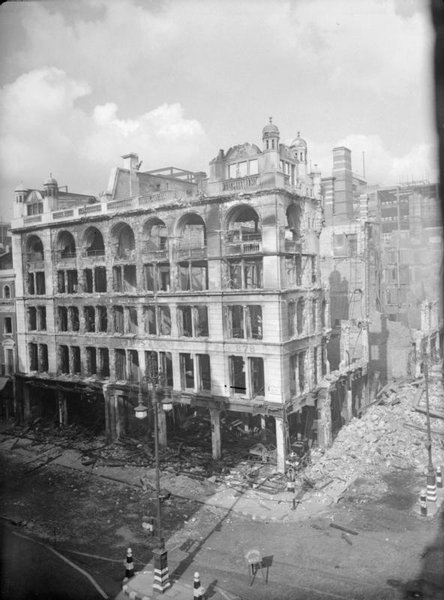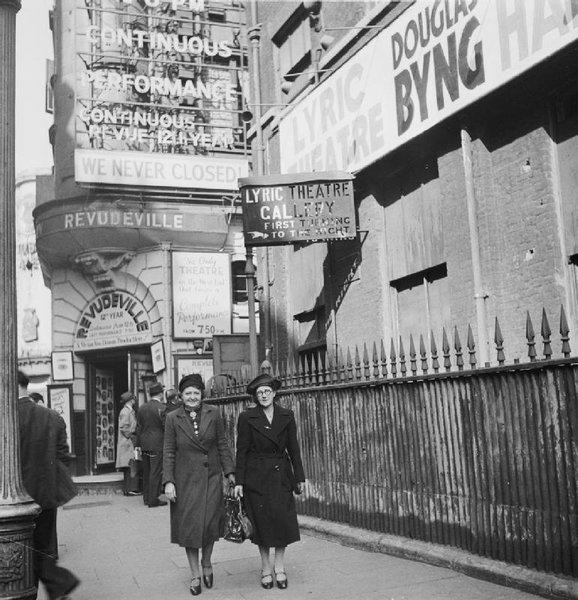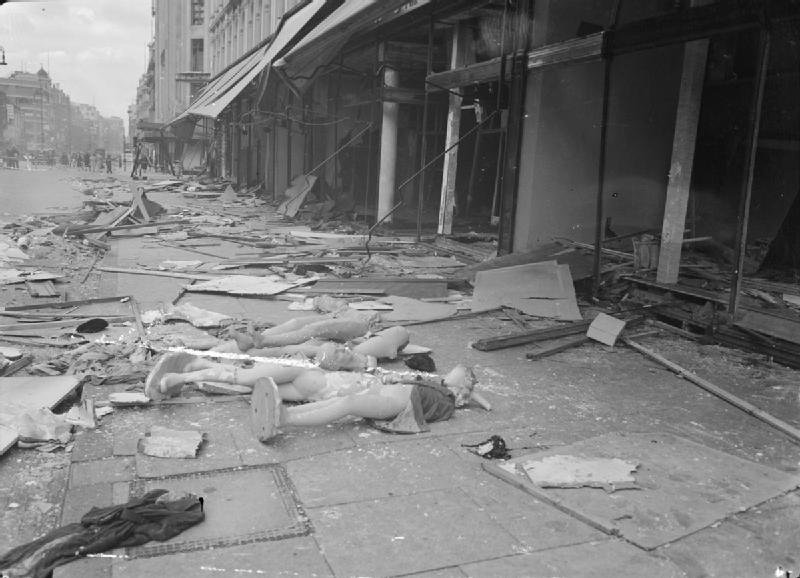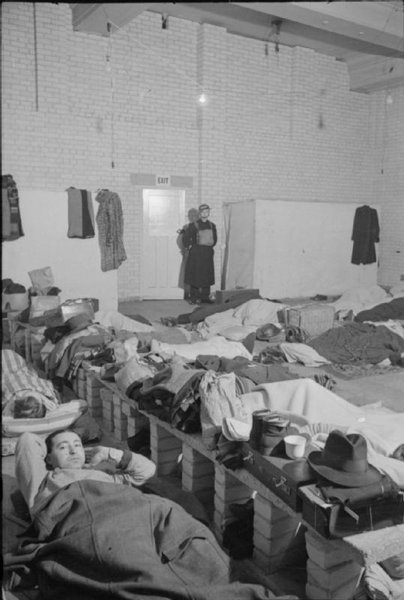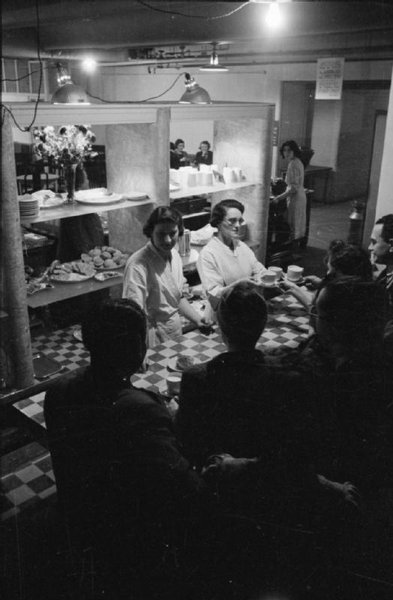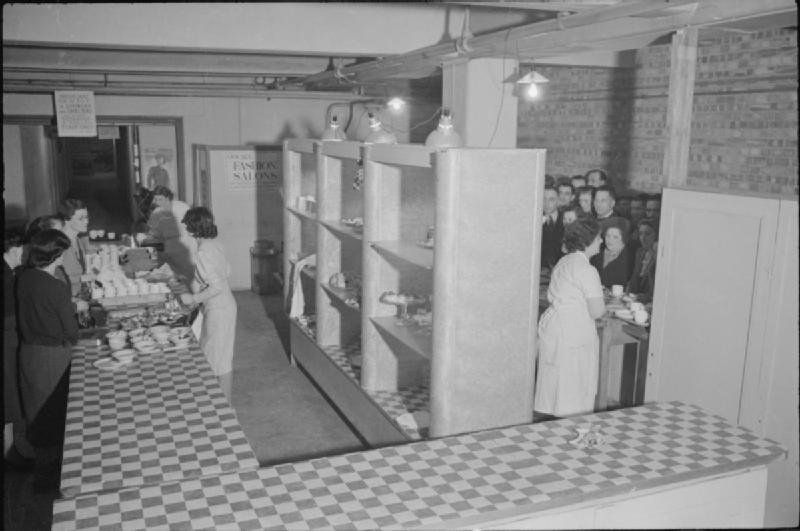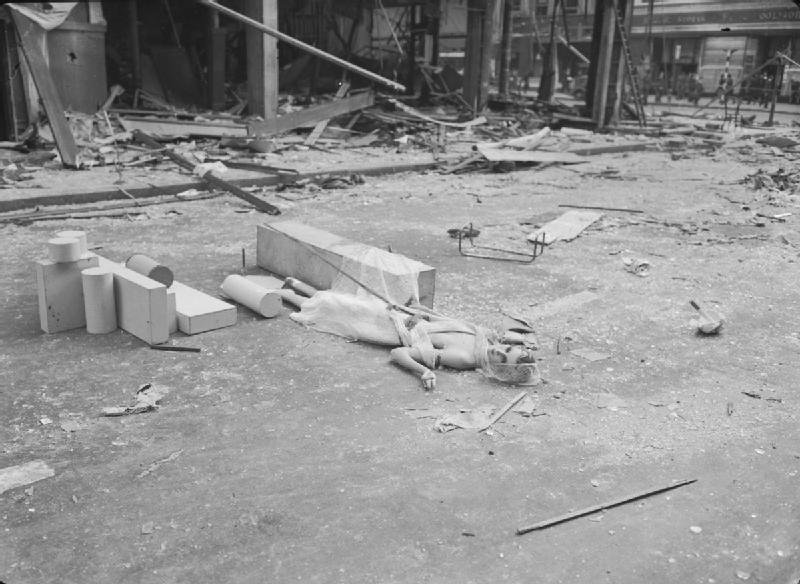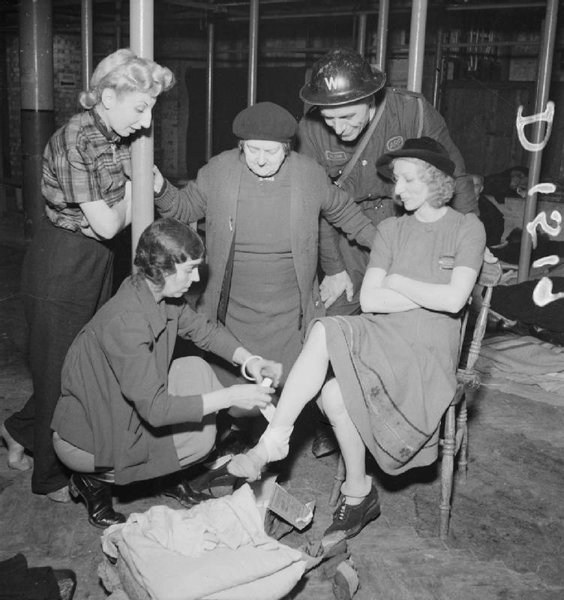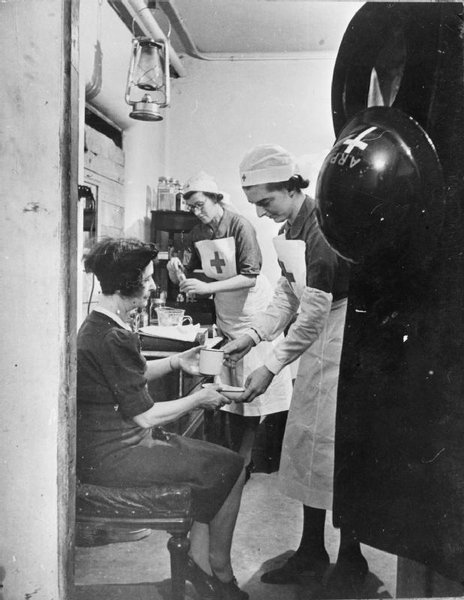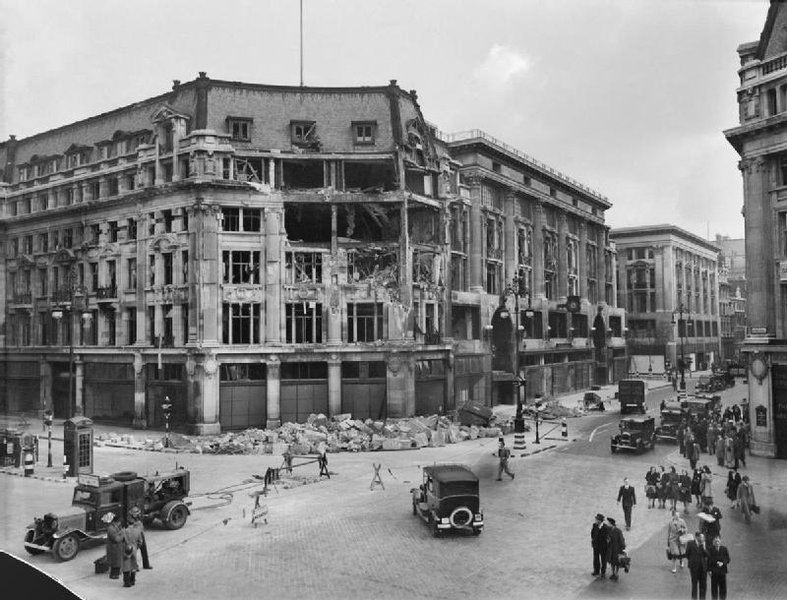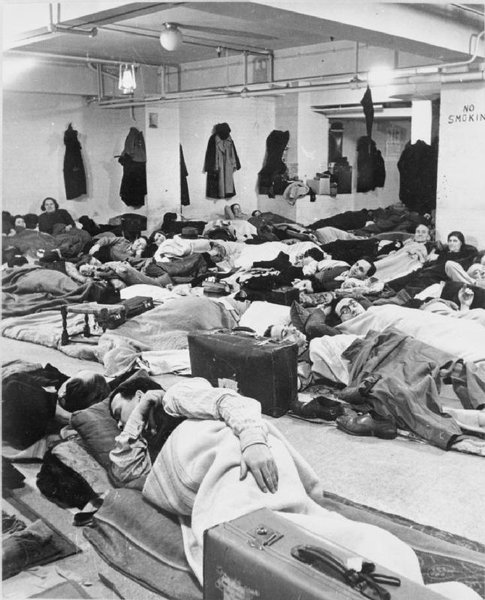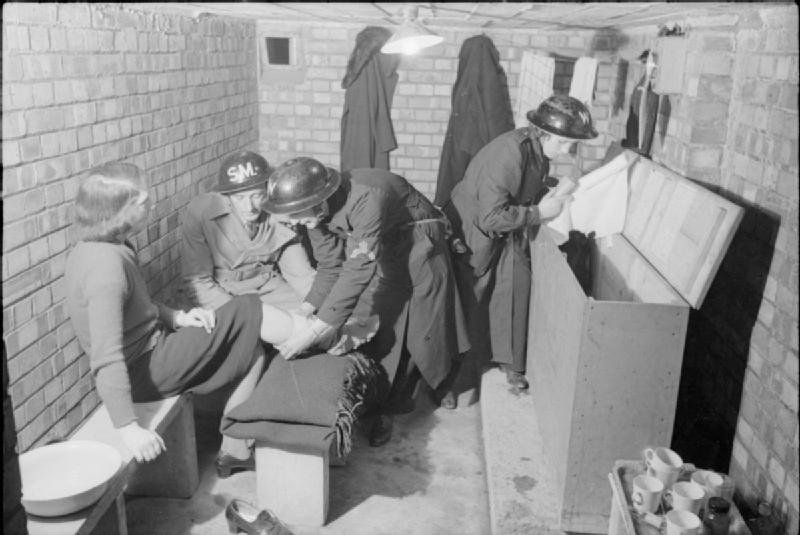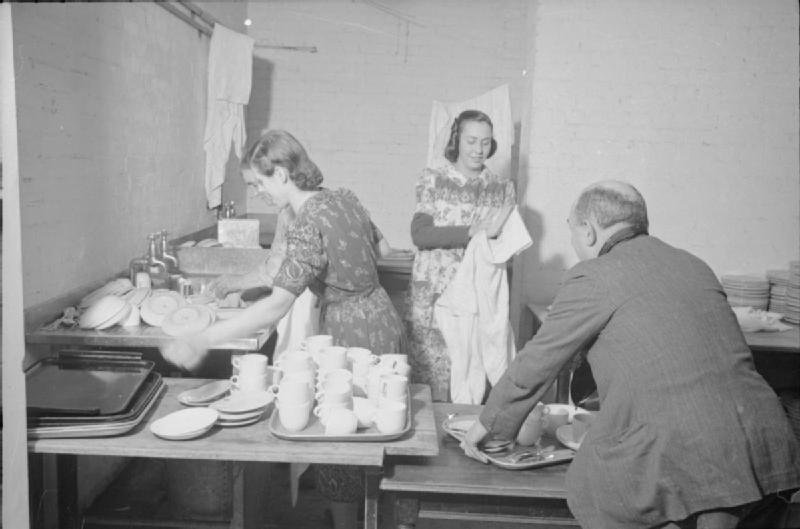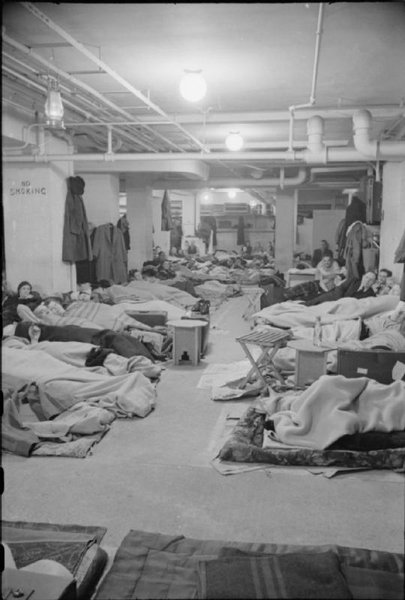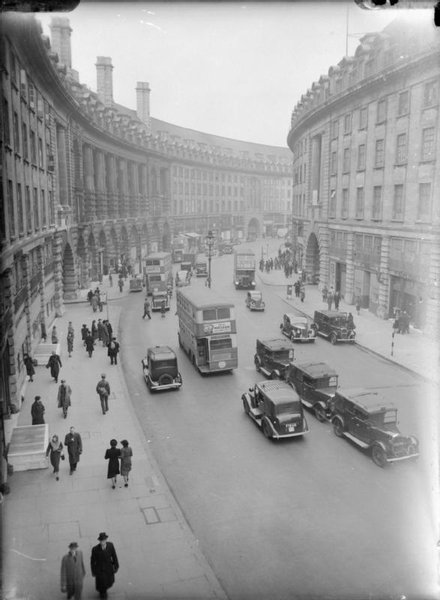Bombs dropped in the ward of: West End
Description
Total number of bombs dropped from 7th October 1940 to 6th June 1941 in West End:
- High Explosive Bomb
- 163
- Parachute Mine
- 4
Number of bombs dropped during the week of 7th October 1940 to 14th of October:
Number of bombs dropped during the first 24h of the Blitz:
No bombs were registered in this area
Memories in West End
Read people's stories relating to this area:
Contributed originally by richard_storer (BBC WW2 People's War)
A Boy's Wartime Memories of London and Dorset
Richard Storer
London
I was born in Hampstead, London in 1933 and though I was too young to understand the concerns and worries that my parents and other adults in the family must have had during the period leading up to the declaration of war, some of it must have been absorbed by my imagination as I have clear memories of digging a large hole which was to be an air raid shelter in our back garden. I don't suppose I had any idea of what an air raid shelter was for but it must have been clear to me that it was something that was going to be needed and that digging a hole was the initial requirement. I also remember that I was careful to dig my hole with a shelf cut into the soil on one of the sides so that I would have somewhere to put a bottle of Heinz tomato ketchup. Presumably I must have overheard talk of stocking shelters with supplies of food and tomato ketchup was obviously something that I did not want to be without.
Amongst my other memories from those times leading up to the war are those of Walls ice cream men pedaling their tricycles round the streets ringing their bells and, when stopped, handing over water ices which were contained in a cardboard tube of triangular cross section. You had to push the ice up from the bottom of the tube and I can still taste the soggy cardboard that used to end up surrounding the business end of the ice. I also remember coal being delivered to London houses by horse and cart, being taken to have afternoon tea at Selfridges and the wonderful model train layout that ran all round the first floor in Hamleys' Regent Street toy shop.
Dorset
An aunt of mine had a house in the village of Chideock in Dorset and I was sent out of London to live with her just before the war started. I was not really aware of why I had been sent to out of London as the move was just like the other Dorset holiday visits to my aunt that had gone before. The reality of what was happening in the world was made a bit clearer when Hobbs, who looked after my aunt's garden, told me on the afternoon of 3rd September 1939 that we were at war with Germany. Hobbs must have been dismayed at what was happening in Europe as he had been lucky to survive the whole of the First World War spent in the trenches of France and Flanders. Many others who served in the same trenches never came home to their Dorset village homes.
To begin with, nothing seemed to alter in West Dorset. We still went down to the beach. The beach huts remained in use and the cafe still dispensed trays with pots of tea for the grown ups and ice cream for the children. Slowly, however, things started to change. I remember one day when we were on the beach that a camouflaged aeroplane, friend or foe I know not, came hurtling in from the sea just feet above the wave tops and lifted up to pass over our heads and disappeared inland along the deep valley that led to the village. Eventually the cafe was taken over by the Home Guard and the cart track that we used for walking to the beach was rebuilt in concrete so that a continuous stream of lorries could wend their way to the shore to be loaded up with pebbles and then return inland with their cargo along the other tarmac road to make even more concrete to be used in the war effort. That concrete track still exists and, though a bit cracked here and there, is still serviceable and in daily use. Sitting on the beach we would sometimes see depth charges or other explosives erupting in the water further out to sea in the Channel. One evening we watched a dog fight by some aeroplanes in the sky just off the coast, eventually seeing one come down, trailing smoke as it dived seawards and followed by a lone parachutist who landed in the sea off Lyme Regis. We subsequently learned that he was a German.
At the beach, the mouth of the valley between the cliffs was eventually filled with a huge wall of scaffolding and the beach itself was dotted with concrete cube obstacles about five feet square and with sloping tops. The bits of low cliff that did not pose a major obstacle to an invading army were wired off and laid with mines. Post holes were dug in the roads leading from the beach and also along the main coast road that ran East West through the village. These holes had removable caps and, at the side of the road, were stored lots of substantial, iron, antitank constructions which would be slotted into the uncapped holes once an invasion seemed imminent. I also remember, and looking back I cannot believe how naive we must have been, that my cousins and I ventured down to the beach and set up watch on the night of the full moon that had been identified by the press as the likeliest time for Hitler to try and invade England. Thank heavens he never came.
Though I remember having been given a gas mask I never remember having to carry it with me in one of the square, brown, cardboard boxes suspended by a bit of string over the shoulder that one sees so often in archive film of the period. I do however remember that another aunt of mine living in London had a shelter bearing some government minister's name ( not Anderson ) which stood in the middle of her front hall and resembled a large rectangular dining room table made out of solid metal of some kind. The idea was that anybody sheltering underneath it would be protected from collapsing walls and other falling rubble should the house be bombed. This aunt's shelter was always draped with a large table cloth and usually sported a pot plant or a vase of flowers placed carefully in the centre. This shelter was never called into service but, towards the end of the war, a V2 rocket did land two houses away down the street and the family portrait of "Uncle Sam" (circa 1820) was damaged by flying debris. My grandmother never forgave " that dreadful Mr Hitler" for the outrage.
I was a wolf cub whilst living in Dorset and I remember on a couple of occasions being put on an open lorry with Arkela and the rest of the cub pack to take part in processions through the local town of Bridport during Spitfire Week or Salvage Week or some other week designed to help the war effort. All sorts of metal was collected at this time; aluminium cooking pots to make aeroplanes and all the iron railings were removed from the tops of the low brick or stone walls which had commonly fronted many houses before the war started.
When rationing was introduced my aunt adopted what, in retrospect, I now realise was a very sensible routine with the rations for the household. She put to one side all the butter, sugar and jam that she required for the week's cooking and, from what was left over, everybody was then issued with their own personal tea time rations for the week. The top of the tea trolley became covered in pots, jars and other containers each containing the jam, sugar and butter belonging to the child whose name appeared on the container label. We were at liberty to eat the lot at Monday tea time if we wished but we would not be issued with any more until the next week's rations were distributed. It was a learning exercise which taught us many disciplines: self control, fair shares, planning, frugality, contributing to the common good etcetera. Like many families during the war, we augmented the shop bought rations by keeping chickens, ducks and rabbits and by growing lots of vegetables.
I remember soldiers being billeted in the village. We had a couple of Highlanders with us in my aunt's house and a piper used to play through the village in the mornings presumably to collect the scattered Scotsmen all together before they went off to their daily duties. I also remember Royal Welch Fusiliers with the black flaps sewn to the collars on the back of their khaki battle dress; flaps which the regiment had worn for hundreds of years ever since a previous Colonel had decided that his soldier's tunics needed to be protected from the white powder on the pigtails of their wigs. At a time when the country faced the ultimate challenge for survival, only the British could go to war in the twentieth century believing that it was still important to protect their battle dress from wig powder. Long may such traditions endure. The only 'action' that came anywhere near us in our Dorset village was one night when a German bomber, presumably fed up and wanting to go home, just jettisoned his bombs which landed harmlessly on the hillside on the outskirts of the village but provided a topic of conversation for several weeks afterwards.
In 1942 I left my aunt's home in Dorset moved to Suffolk to join my mother and stepfather.
After the war ended in 1945 I went back to look at the home where I had been born in 1933. The house where we had a flat was still there but a nunnery that was 2 door away had been bombed and apparently some of the resident nuns were killed. I also went down the road and round the corner to take a look at the nursery school that I used to be taken to in the mornings. As I walked towards it, memories of the smell of Jey's Fluid which was liberally used in the toilet came back to me and I wondered if the smell would still be there. The smell had gone and so had the nursery school, bombed like so much else in London.
Contributed originally by jboore (BBC WW2 People's War)
One month after the outbreak of WW2 I celebrated my 17th birthday and left my job as a messinger in the West End of London where I met many interesting people , even royalty!
A typical job was going with Logie Baird and wife to the opening night of a play at the Lyric Theatre, Shaftsbury Avenue. Anna Neagle was playing the part of Queen Victoria in “Victoria Regina” and royalty was attending. All I had to do was, because of crowds expected and no car parking in the area, go with the chauffeur and , on the Logie Bairds leaving the theatre acknowledge them and then run to get the car and driver which were parked at the top of the avenue.
Whilst parked during the performance the chauffeur had instructions to take me for a meal at a local restaurant, and after taking the Logie Bairds home to Kensington deliver me to my home in Battersea. I also got a £1 tip (nearly double my wage) so I have loved T.V. ever since. (Logie Baird invented T.V.).
I had a call one day to report to a hotel in Picadilly to meet a Mr. Stone, little did I know how interesting the next few weeks were going to be. Mr. Stone was resplendent in red frock coat black trousers with gold braid , and to my amazement informed me that, owing to the coronation of King George VI, messengers were required to liase between Buckingham Palace and various embassies and dignitaries that were in London for the ceremony and I had been chosen to work with him to carry out those duties. I was given a red armband to place over the sleeve of uniform O.H.M.S.was on the armband. This period of my life left me with lifelong memories of
This period of my life left me with lifelong memories of meeting many important people of fame, also going through thousands of people outside of Buckingham Palace, into the Palace to deliver various letters and parcels for the King’s attention, also I got a taste of luxurious living, Mr. Stone made sure I got a good breakfast each day, I think it was as much as my family got in a week.
After the Coronation I was presented at a ceremony in St. Martins-in-the-Fields with the Coronation Medal by Sir Philip Game Commissioner of Metropolitan Police, for services to the crown. (No tip but a medal)!!!
A week later I had to take an urgent letter to Sir Charles Craven, (boss of Vickers Armstrong). His residence in London was in Knightsbridge. The head porter offered me a job at 27/6 weekly, I was now 15 years old and the wage was double my income, I accepted. So it was off with the old uniform and go to St. James Street for measurement of a splendid outfit of full evening dress, ie: frocktail coat gold braid trousers, fancy waistcoat, white front with bow tie, also white gloves. Clothing was port wine colour.
The residents included, Lords, Admirals, Generals, M.P.s and many more notable people including Arthur Sainsbury, who used to give me 10/- now and again to bet on one of his racehorses.
A couple of happy years were spent there, very often serving drinks etc at socials given by residents, many times going home with lots of sandwiches , vol-au-vents etc,(leftovers). I also became John, not Jack.
Putting that all behind me I became a lathe machinist at the Projectile Engineering Co. The factory at Wandsworth produced various sizes of bombs and shells, I was put on a machine on a section producing the 25lb anti-tank shell, a vast change from my previous life. After a few days I aquired the know how of the lathe and got onto the magic of piece work. My wage now jumped to a fantastic average of £14 a week, my father was earning approximately £4 weekly, so you can see imagine my jump to wealth amazed me.
Life those days were very grim, the Germans were bombing London frequently. I was on was on shift work and after a while we ignored air raid warnings and carried on with our job until bells started ringing, warning us of danger, i.e. that bombs were dropping in our area, and only then we took shelter.
Two of my brothers were in the Army and two younger ones were evacuated to Devon, so getting fed up with the bombing etc, I volunteered for the Royal Navy.
Taking a day off work I went to a recruiting office and signed up, awaiting a medical and call up at a later date. On reporting for work the next day I was asked by my foreman why I was not at work the previous day, on learning the reason, gave me a ticking off and said “you are on urgent war production and cannot join the Navy”. Life was not very happy at that time, you could be prosecuted for not turning up for work, or could be called up for the Army. After a while I was called into the office and given permission to join the Navy.
May 1940 there was a broadcast from the government for civilians to join a unit called Local Defence Volunteers, later named the Home Guard. I joined the Projectile Engineering Co. Section and served with them until I joined the Royal Navy. Our uniform badges was of the Kings Royal Rifle Corps. That’s how I got the defence medal.
I must have been crazy to leave a £14 weekly job for 2/-(20p) a day as 2nd class stoker. I reported to H.M.S. Duke, a shoe establishment at Gt. Malvern, Worcs, to learn the rudiments of naval life.
My 19th birthday I spent square bashing, not a very good day! Six weeks later came reality, posted to Royal Naval Barracks, Chatham.
Introduction to H.M.S. Pembroke came as a shock, thousands of sailors in barracks and on ships in the dockyard, whistles blowing if you happened to be on the wrong side of road, i.e. officers only area, yelling orders and doubling across massive parade ground, fire fighting school, gas school, working in boiler or engine rooms that were on the ships in dockyard and many more tasks I never dreamed of. After a period in this chaotic routine I was posted to a mine sweeper at Grimsby. The boat was in the midst of a refit, pipes wires and hoses cluttered the decks, my vision of a sleek modern destroyer or cruiser was shattered, the ship was filthy, so, as you can imagine I was not a happy sailor. Four days later the German air force bombed Grimsby naval area, a bomb fell next to the ship causing damage so, once again pack bag and hammock and return to navy barracks at Chatham. That was the only time in my life that I was pleased to see the Germans.
A few weeks later ordered to drafting office, 5 of us were posted to H.M.S. Woolston, a 1917 destroyer based in Scotland, so I packed my kitbag and hammock and was off once more. We travelled all night and arrived at Inverkeithing the next day.
H.M.S. Woolston was at sea, we were put onboard H.M.S. Cochrane, a depot ship in Rosyth. A few days’ later plans were changed, H.M.S. Vortigern was to be my assignment, I packed my worldly possessions and went to Vortigern, unpacked my gear and settled down in my new home (so I thought).
A few days’ later plans were changed !!! H.M.S. Woolston arrived in harbour, lots of activity in harbour, ships getting ready urgently to go to sea. I was ordered to join H.M.S. Wolston, once again pack my gear and board my original ship. We were topped up with oil and ammunition.
The German battleship “Tirpitz” had left her base in Norway and all available destroyers in our area were dispatched to intercept her. A chase at full speed up into arctic waters then began. Not a nice initiation into life in the Royal Navy, (the thought of Bear Island still makes me shiver).
Fortunately we never sighted the Tirpitz, apparently she got information about a fleet at sea to intercept her and Tirpitz, to our relief returned to Norway.
Shortly after our return to Rosyth we heard the tragic news that H.M.S.Vortigern had been torpedoed by German E-boats off the East coast and out of a crew of 212 only 12 survived. Lady luck was with me.
About 60 destroyers were built during the First World War, the ships were named with the initials of V and W. Modesty and privacy was soon forgotten as soon as you arrived on these ships, washing facilities consisted of 5 hand basins in a room of no bigger than a broom cupboard, and toilet, 5 stalls (no doors) for the ratings of about 160, fortunately being engine room branch our clothing was minimal i.e. a boiler suit over our underwear when at sea. Washing was done in a bucket and put to dry in the boiler room above the boilers. The seamen very often never took their clothes off on putting to sea. Life was horrendous, trying to get along the deck to get to your area of duty, boiler or engine room during rough seas, or trying to have a meal when sometimes the side of the ship was above your head was beyond description. The stokers mess deck was forward on ship, down a round hatch about 36” diameter, 22 ate and slept in an area no bigger than an ordinary living room, if action stations sounded there was a mad rush to get out of that area as soon as possible.
When in northern waters condensation poured down the side of the ship, thus giving permanent damp conditions , if in the Mediterranean area the air conditioning was insufficient to keep cool, so one went from one hell to another, it wasn’t unusual to be in Arctic waters one month then in the Mediterranean a month later.
H.M.S Woolston was my home for three years. Atlantic convoys, Arctic, North Sea Convoys, patrols in Northern waters, Mediterranean,North Africa, Italy and the Sicily Invasion.
Joining as a 2nd class stoker 2/- a day (20p), leaving as a Leading Stoker. I returned to Chatham and later got posted to H.M.S Suffolk a 10,000 ton cruiser going out to Australia.
War ended as did my 4 ½ year service in the Royal Navy. For my efforts I got £83.
Contributed originally by ruthpeplow (BBC WW2 People's War)
The following reminiscences are from exRAF,WAAF and Fleet Air Arm personnel who served at RAF Peplow in Shropshire. They were collected by myself for a Millennium project for the village of Eaton upon Tern, the original stories are buried in a time capsule in the village garden.
1. From RAF electrician Sid Willis of Dunstable.
I arrived at RAF Peplow by train in the spring of 1944 straight from an electricians course at RAF Credenhill. The first thing I was issued with was a sit-up and beg bicycle. I was billeted in a Nissen hut on a site with no hot water, this meant you carried your toilet gear together with your knife, fork and spoon plus mug in a side pack with you everywhere.The only hot water available was in a wash house behind the cook house, you washed there before breakfast and in the evening after coming from Dispersal. Laundry was done on site but your stiff separate collars, of which you had two, or more if possible, had to be sent to the Chinese laundry in the nearby town of Wellington for special treatment, they came back stiff and shiny and could worn for several days.
To reach the Dispersal site near Childs Ercall we used our RAF bikes. One chap, an instrument fitter could not ride a bike so must have walked miles unless he was lucky enough to get a lift. The electricians had half a Nissen hut and the instrument fitters the other half. I was matey with an instrument fitter Charlie Davis who came from Birmingham. He had his own bike and every week, on his day off, he would cycle to Birmingham to see his wife. One day Charlie was refilling the oxygen tanks on the Wellingtons. There was a fitting on the outside of the aircraft which was connected to cylinders on a trailer drawn by a tractor. Whilst still connected to the aircraft the NAAFI tea wagon arrived and Charlie, not wanting to miss it, jumped on the tractor and started to move off at a rate of knots until a severe jolt reminded him that he had an aircraft in tow!
Charlie and I used to like dancing and we used to cycle to Newport several times a week, we use to go out through the perimeter wire near Childs Ercall, without a pass of course.
On Dispersal there was an electrician called Alf Banner who like myself came from East Ham, we became great friends. He was a professional stage artist, a song and dance man - a very good tap dancer. He got the job of arranging the camp concerts. I went with him to perform at Donnington Army camp where we were treated like royalty! He later went into the army continuing his stage shows "Stars in Battledress", and finally with his wife appeared in theatres and clubs until his death from a heart attack in his dressing room.
One day a Warrant Officer Pilot came into Dispersal asking if anyone lived in London. He was taking his Wellington to RAF Wing near Leighton Buzzard, from there you could catch a train and be in London in two hours. Just then Alf walked into the hut and I said grab your bag we are going home, he didn't know what had hit him, we ran to the plane which was revving up and climbed the ladder in the nose. We pulled up the ladder, shut the door and were told to stand in the middle of the plane by the astrodome and away we went.
When we landed we asked the pilot to sign our passes as we had left Peplow without anyone knowing. Eventually after avoiding awkward questions from Officers as to who we were etc. the pilot told them that our names and numbers had been taken by the Duty Officer at Peplow, which of course they hadn't! In the end bull baffled brains and an officer signed our passes.
We were still in our working uniform, oil stained, black plastic buttons and badges and wellington boots so we had a wash and a shave in the wash house, then washed our boots and pulled our trousers over them. We caught a bus to Aylesbury, boarded a train to London and arrived in East Ham during an air raid. At my home I had a job making my parents hear me banging on the door as they were in the air raid shelter in the back garden.
The following day, after a stroll round East Ham, Alf decided he wanted to see a West End show. So with wellington boots blacked to try and get some sort of shine on them! we headed for the London Palladium to see Tommy Trinder and Zoe Gail in "Best Bib and Tucker". We paid 2/6 to stand at the back of the stalls, looking around us we spotted a young chap, of military age, with his girlfriend in a box overlooking the stage. We, of course, passed comment - like service dodger etc. and then thinking no more about it. Suddenly there was a tap on my shoulder, we think it is the M.P's, but no, it's the chap from the box inviting us to share it. Alf couldn't get there fast enough, there were just four ordinary chairs and he grabbed the one next to the girl leaving the boyfriend and myself to sit behind them. There we sat, dirty uniforms and wellington boots in a box at the London Palladium! It was a great show and I have never sat in a box since.
On arriving back at Peplow our Corporal reprimanded us for leaving without permission as he had wasted time asking where Willis and Banner were only to be told eventually that we had gone off in a Wellington.
Late 1944 I was posted to the satellite station at Sleaford and as far as I can remember we were snowed in most of that winter.


